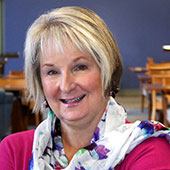
It is hard for me to believe, but in April of 2019, the HS/HSL will have been open for 21 years. Having served as client project manager during the original planning of the building, I find this 21st anniversary an occasion to reflect on the idea of library as “place.” If I had a dollar for every time I have heard, “Why do you need a library? Everything is online (and in some minds, free),” I would be very rich. It is true, however, that if we were building a library today, it would be a very different facility. Yet the library we built back in the 1990’s has proven remarkably flexible and adaptable to modern needs.
We designed this beautiful building as a symbol of UMB’s aspirations to be a premier public research institution and a major player in the health sciences and human services. And while I am not saying it is because of the Library that this has happened, I will say the buildings we build illustrate how we feel about ourselves. Library buildings are cultural icons. Even the most digitally attached person knows what a library is.
While we certainly don’t need the room for collections we once did, our library has met other needs through our Innovation Space, Presentation Practice Studio, Frieda O. Weise Gallery, and consultation and collaborative spaces as we have evolved with our users. Students are the biggest users of our physical space, and for them we are a refuge, a place of contemplation and collaboration. Even though we have more study rooms (45) and seating than most other health sciences libraries, it’s still not enough. While we have not seen any fistfights, things do get a little tense during midterms and finals when students can’t find places to study. We are FULL.
Over the next six months, we will be refurbishing our main floor as things have gotten a little threadbare, worn, and dated over 21 years. We have already started with the addition of our “pilot” of booths on the second floor and third floor tower. More to come. We are very thankful UMB Administration has approved funds for five years to do a little bit more modernization every year.
I am closing by thanking so many people who have supported our “place” over 21 years. Our tenants – CITS, the Counseling Center, Student Accounting, the Registrar and Bursar – all great building colleagues. University Administration. Facilities Management, who clean, maintain, and support our infrastructure, taking as much pride in our building as we do. And, finally, the many library team members who have passed through over the years. Their pride in the building and vision for change is always inspiring.
I hope you can join us for some of our events celebrating 21@601. As always, you can find previews of our upcoming events in Connective Issues.
Best wishes for a wonderful holiday break and exciting 2019!










